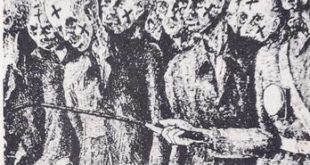In the United States election campaign of 1964, President Johnson was the candidate of the Democratic party. His Republican opponent was Senator Barry Goldwater of Arizona, who was known for his controversial stand on many issues. Goldwater called for a radical change in the Policies of the government. He opposed the reforms enacted since the early 1950’s, as well as attempts to match agreement with the Communist nations, arguing that Communists understood nothing but force. He deplored United States recognition of the Soviet Union and on occasion, even advocated that the United States withdraw from the United Nations. In answer …
Read More »Tag Archives: Stalin
A Time of Change 1948-1962
All times are, more or less, times of change, but the changes that took place in the 1950’s and 1960’s were extraordinary. This was particularly true in the part of the world dominated by the Soviet Union. During Stalin’s rule, the satellite countries — East Germany, Poland, Czechoslovakia, Rumania, Hungary, Bulgaria and Albania — were like provinces of Russia. The one exception in Eastern Europe was Yugoslavia. In 1948, the Yugoslav government, headed by Josef Tito, refused to follow Stalin’s orders and insisted on maintaining its independence. This was possible for two reasons. There was no Russian army in Yugoslavia, …
Read More »The Thaw in the Cold War 1953-1959
Stalin had left behind him a world of suspicion, distrust and fear. Suspicion, distrust and fear were as great in his own country as anywhere else, for he had ruled as a dictator and had never set up a definite procedure for transferring power to another leader. Immediately after his death, a five-man presidium, or council, took over the rule of the Soviet Union. The presidium chose Georgi Malenkov, who had been Stalin’s right-hand man, as the new premier, but a number of factions were struggling for control of the government and one of them was led by Lavrenti Beria, …
Read More »The United Nations and the Nations Disunited 1943 -1949
So at last, in the Pacific as in Europe, the guns were silent; the nations that had brought so much death and destruction to the world had been defeated, but victory alone was not enough. Governments had to be set up for the defeated nations, the destruction of war had to be repaired, hungry people had to be fed, industry and commerce had to be set in motion. Even more important, a way had to be found to keep war out of the world, to settle disputes between nations by peaceful means rather than by violence. The League of Nations, …
Read More »A World at War 1939 – 1941
Now the people of Europe began to hear a new sound, a sound that would haunt them throughout the years of war — the wail and shriek of air-raid sirens. At night, the lights of Europe went out and the “blackout” made familiar streets strange places of darkness. Street lamps were left unlit and windows were covered with heavy draperies. Any stray gleam of light might help guide enemy bombers to their targets. Hurrying about their wartime duties, the people of Britain and France began to wonder. They had not wanted war and yet war had come. Why? What had …
Read More »Totalitarianism Versus Democracy
AS THE 1930’s drew to a close, only eight countries in Europe, besides Great Britain and France, were still democracies. They were Belgium, Holland, Switzerland, Czechoslovakia, Norway, Sweden, Denmark and Finland. Three of Europe’s most important nations were dictatorships. The Soviet Union was communist; Germany and Italy were fascist. There had been dictatorships before, but these went further; they were totalitarian. The word “totalitarian” comes from the word “total,” and total control is what these dictatorships were after — total control of their people, total control of their actions and thought. There were differences between the totalitarian countries. While Stalin …
Read More »The Election of 1936
As Roosevelt’s first term in office neared its end, many people in the United States — and in other countries — wondered if the New Deal could really solve America’s problems. More than that, they wondered if Americans would continue to follow the path of democracy. A wave of totalitarianism was sweeping the world; would it reach as far as America? There was no doubt that there were some Americans who supported Hitler and the Nazis. Members of the German-American Bund paraded in brown shirts and held a mass meeting in New York’s Madison Square Garden, but there were comparatively …
Read More »The Meaning of Totalitarianism
So it happened that in many parts of the world people were living under a system of government that came to be called totalitarianism. There were differences in the governments of the totalitarian countries, but they were alike in certain important ways. In each of them, the government was controlled by one political party, usually under a dictator and no other political parties were allowed. The ruling party was not satisfied to control the government; its aim was total control of the life of its people. It controlled the courts and the armed forces, labour and industry, science and the …
Read More »






